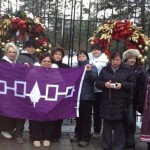By Monica Brown, Tulalip News Writer
A band council delegation from the beleaguered Attawapiskat community hand-delivered an ultimatum to Chief Theresa Spence, informing her they would oust her from office unless she ended her liquid-diet protest. Spence announced that she is will end her 44-day hungerstrike and is scheduled to return to eating solid food on January 24, the day that chiefs conduct a major treaty meeting in Vancouver, British Columbia.
Before Spence agreed to end her six-week-long liquids-only fast, Spence and her supporters wrote up a Declaration of Commitment consisting of 13 points. The 13 points specifies adherence to treaty relationships, approaching negotiations from a nation-to-nation perspective and taking measures to improve the lives of First Nations people and calls for a national inquiry into the hundreds of disappearances and murders of aboriginal women that go unsolved, improving education and housing, and fully implementing the United Nations Declaration on the Rights of Indigenous Peoples.
The Declaration of Commitment is endorsed by the AFN National Executive Committee, the Native Women’s Association of Canada, the Liberal Party of Canada Parliamentary Caucus and the New Democratic Party National Caucus. It will officially be signed by the parties on January 24 by First Nations leaders and representatives of the opposition parties.
The 13 points can be read in full below
First Nations: Working Towards Fundamental Change
In the true spirit of commitment to initiate dialogue to discuss both Treaty and non-Treaty Indigenous issues on behalf of our First Nations Peoples of Canada, Chief Theresa Spence of Attawapiskat First Nation and Mr. Raymond Robinson of Cross Lake, Manitoba will continue their Hunger Strike, pending outcome of this written Declaration. We also like to acknowledge Mr. Jean Sock of Elsipogtog, New Brunswick and all other Fasters who have shown their deep dedication and courage in support of protecting and honouring both Treaty and non-Treaty obligations as written, entered into or understood by all Peoples, with the Federal Government of Canada including each Provincial/Territorial signatory.
Further, we agree the self-sacrifice and the spiritual courage of Chief Theresa Spence, along with Elder Raymond Robinson and all other fasters have made clear the need for fundamental change in the relationship of First Nations and the Crown. We fully commit to carry forward the urgent and coordinated action required until concrete and tangible results are achieved in order to allow First Nations to forge their own destiny.
Therefore, we solemnly commit to undertake political, spiritual and all other advocacy efforts to implement a renewed First Nations – Crown relationship where inherent Treaty and non-Treaty Rights are recognized, honoured and fully implemented as they should be, within the next five years.
This Declaration includes, but is not limited to, ensuring commitments made by the Prime Minister of Canada on January 11th, 2013 are followed through and implemented as quickly as possible as led by First Nation on a high-level priority with open transparency and trust. Furthermore, immediate steps are taken working together to achieve the below priorities:
1. An immediate meeting to be arranged between the Crown, Federal Governments, Provincial Governments and all First Nations to discuss outstanding issues regarding the Treaty Relationship, as well as for non-Treaty area relationships.
2. Clear work-plans that shall include deliverables and timelines that outline how commitments will be achieved, including immediate action for short, medium and long-term goals. Addressing the housing crisis within our First Nation communities shall be considered as a short-term immediate action.
3. Frameworks and mandates for the implementation and enforcement of Treaties between Treaty parties on a Nation-to-Nation basis.
4. Reforming and modifying the comprehensive claims policy based on inherent rights of First Nations.
5. A commitment towards resource revenue sharing, requiring the participation and involvement of provinces and territories currently benefiting from resource development from traditional lands.
6. Commitment towards ensuring a greater collective oversight and action towards ensuring the sustainability of the land through a sustained environmental oversight.
7. A comprehensive review and meaningful consultation in regards to Bill C-38 and C-45 to ensure it is consistent with Section 35 of the Constitution Act (1982).
8. Ensure that all federal legislation has the free, prior and informed consent of First Nations where inherent and Treaty rights are affected or impacted.
9. A revised fiscal relationship between First Nations and Canada that is equitable, sustainable and includes indexing and the removal of arbitrary funding caps.
10. A National Public Commission of Inquiry on Violence Against Indigenous Women of all ages.
11. Equity in capital construction of First Nation schools, including funding parity with Provincial funding formulas with additional funding support for First Nation languages.
12. A change in how government operates that would include direct oversight, a dedicated Cabinet Committee and Secretariat within the Privy Council Office with specific responsibility for the First Nation-Crown relationship to ensure implementation.
13. The full implementation of the United Nations Declaration of the Rights of Indigenous Peoples – UNDRIP.





